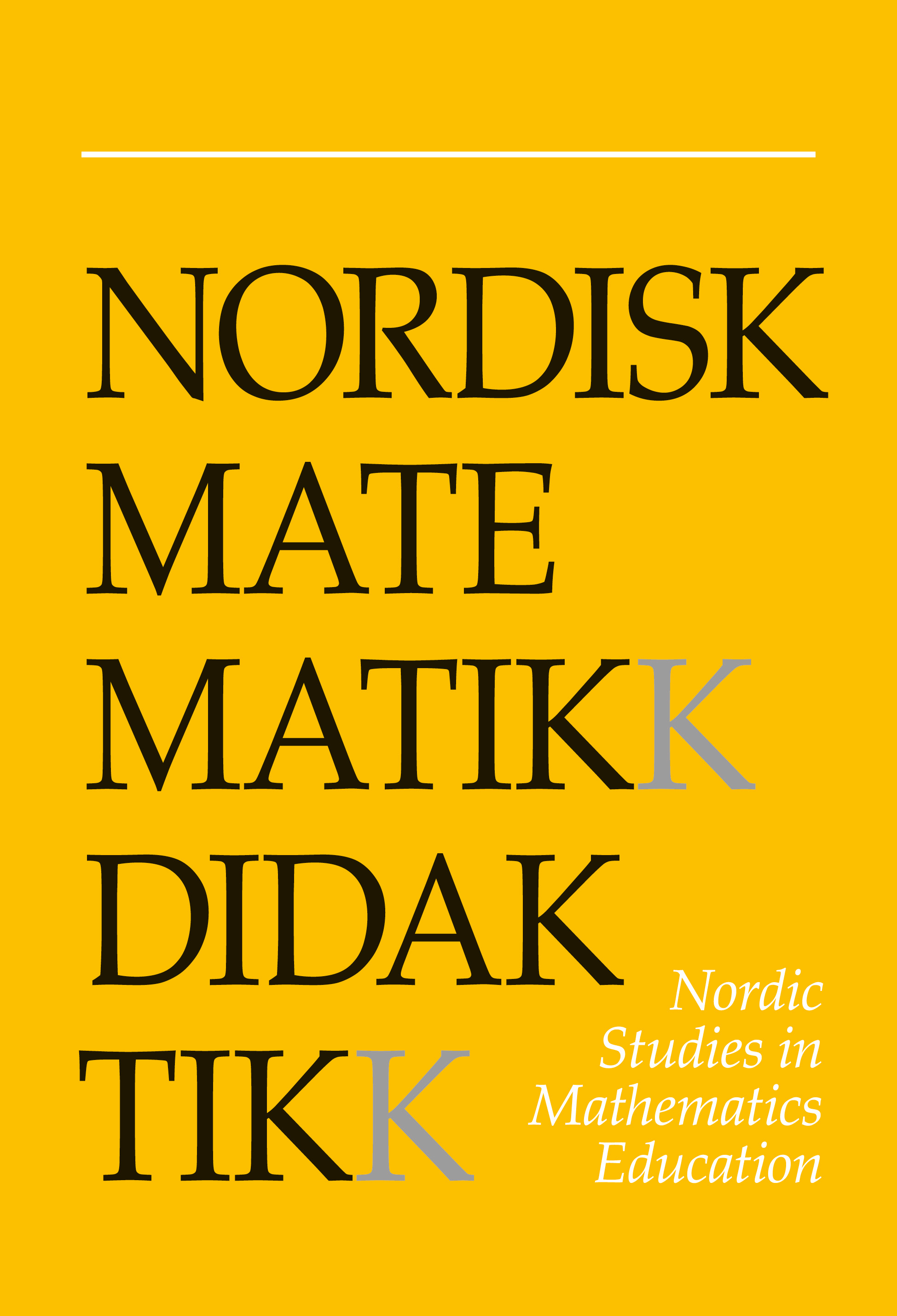Affektive sider ved lærerstudenters arbeid med matematikk
DOI:
https://doi.org/10.7146/nomad.v15i2.148242Abstract
Formålet med artikkelen er å belyse og drøfte sider ved allmennlærerstudenters utvikling av lærerkompetanse i matematikk. I empiriske analyser har jeg har valgt å fokusere på studenters affektive eller følelsesmessige forhold til læring av/arbeid med matematikk; som er sett som et delaspekt ved lærerkompetansen. I første del av artikkelen redegjør jeg for sentrale teoretiske utgangspunkt; et triadisk syn på læring og en kommunikativ tilnærming til analyser og beskrivelser av læring og undervisning. Andre delen av artikkelen starter med analyser og beskrivelser av affektive sider gjennom utvalgte eksempler fra studenters arbeid med matematikk. Disse beskrivelsene er utgangspunkt for en avsluttende problematisering og drøfting av hvordan affektive sider kan influere på studenters utvikling av lærerkompetanse i faget.
References
Ball, D. L. & Bass, H. (2004). Knowing mathematics for teacahing. In R. Strässer, G. Brandell, B. Grevholm & O. Helenius (Eds.), Educating for the future. Proceedings of an international symposium on mathematics teacher education (pp. 159-178). Stockholm: Royal Swedish Academy of Sciences.
Boaler, J. (2003). Studying and capturing the complexity of practice - the case of the "dance of agency." In N. Pateman, B. Dougherty & J. Zilliox (Eds.), Proceedings of the 27th conference of the international group for the Psychology of Mathematics Education (pp. 3-16). Honolulu, Hawaii: PME.
Evans, J., Morgan, C. & Tsatsaroni, A. (2006). Discoursive position and emotion in school mathematics practices. Educational Studies in Mathematics, 63 (2), 209-226. https://doi.org/10.1007/s10649-006-9029-1
Freudenthal, H. (1991). Revisiting mathematics education - China lectures. Dodrecht: Kluwer.
Gjerdrum, A., Bue, T. & Grossmann, W. (1989). Jeg regner 4. Oslo: Cappelen.
Halliday, M. A. K. (1985). An introduction to functional grammar. London: Arnold.
Halvorsen, A. R. & Johnsbråten, H. (2001). Matematikkrådets undersøkelse blant nye studenter år 2000. Available 20 June, 2010 from http://matematikkradet.no/rapport2001/v2001.html
Halvorsen, A. R. & Johnsbråten, H. (2006). Matematikkrådets undersøkelse høsten 2005. Available 20 June, 2010 from www.mi.uib.no/nmr/rapport2005/NMRRapportH2005.pdf
Hole, A. (2001). Grunnleggende matematikk. Oslo: Universitetsforlaget.
Holland, D., Skinner, W., Lachicotte, J. & Cain, C. (1998). Identity and agency in cultural worlds. Cambridge: Harward University Press.
Illeris, K. (1999). Læring - aktuell læringsteori i spenningsfeltet mellom Piaget, Freud og Marx. Roskilde: Universitetsforlaget.
Kaasia, R., Hannula M. S., Laine, A. & Pehkonen, E. (2008). Socio-emotional orientions and teacher change. Educational Studies in Mathematics, 67, 111-123. https://doi.org/10.1007/s10649-007-9094-0
Kress, G. (1982). Learning to write. London: Routledge and Kegan.
KUF (1999). Rammeplan og forskrift. Allmennlærerutdanning. Oslo: KUF. Lakatos, I. (1979). Proofs and refutation. Cambridge University Press.
McLeod, D. (1992). Research on affect in mathematics education: a reconceptualization. In D. A. Grouws (Ed.), Handbook of research on mathematics teaching and learning (pp. 575-596). New York: Macmillan.
McLeod, D. (1994). Research on affect and mathematics learning in the JMRE: 1970 to the present. Journal for Research in Mathematics Education, 25 (6), 637-647. https://doi.org/10.2307/749576
Mellin-Olsen, S. (1984). Eleven, matematikken og samfunnet. Oslo: NKI.
Mellin-Olsen, S. (1987). The politics of mathematics education. Dodrecht: Kluwer.
Mellin-Olsen, S. (1989). Kunnskapsformidling. Rådal: Caspar Forlag.
Mellin-Olsen, S. (1991). Hvordan tenker lærere om matematikkundervisning. Landås: Bergen LHS.
Morgan C., Evans, J. & Tsatsaroni, A. (2002, April). Emotion in school mathematics practices: a contribution from discursive perspectives. Presented at the 3rd international conference on mathematics education and society, Helsingør. Available 20 June, 2010 from http://www.mes3.learning.aau.dk/ Papers.htm
Ongstad, S. (1997). Sjanger, posisjonering og oppgaveideologier. Et teoretisk- empirisk bidrag til et tverrfaglig semiotisk og didaktisk sjangerbegrep. Trondheim: NTHU.
Ongstad, S. (2004). Språk, kommunikasjon og didaktikk. Norsk som flerfaglig og fagdidaktisk ressurs. Bergen: Fagbokforlaget.
Pickering, A. (1995). The mangle of practice: time, agency, and science. University of Chicago Press. https://doi.org/10.7208/chicago/9780226668253.001.0001
Rommetveit, R. (1972). Språk, tanke og kommunikasjon. Oslo: Universitetsforlaget.
Sfard A (2001) There is more to the discourse than meets the ears: looking at thinking as communication to learn more about mathematical learning. Educational Studies in Mathematics, 46, 13-57. https://doi.org/10.1023/A:1014097416157
Sfard, A. & Prusak, A. (2005). Identity that makes difference: substantial learning as closing the gap between actual and designated identities. In H. L. Chick & J. L. Vincent (Eds.), Proceedings of the 29th conference of the international group for the Psychology of Mathematics Education (Vol. 1, pp. 37-52). Melbourne: PME.
Sfard, A. (2007). When the rules of discourse change, but nobody tells you - making sense of mathematics learning from commognitive standpoint. Journal of Learning Sciences, 16 (4), 567-615. https://doi.org/10.1080/10508400701525253
Skovsmose, O. (1998). Undersøkelseslandskaper. In T. Dalvang & V. Rohde (Eds.), Matematikk for alle. Rapport fra LAMIS' 1. sommerkurs Trondheim 6.-9. August 1998 (pp. 24-37). Landås: LAMIS.
Säljö, R. (2001). Læring i praksis. Et sosiokulturelt perspektiv. Oslo: Cappelen.
Vagle, W. (1995). Kritisk tekstanalyse. I J. Svennevig, M. Sandvik & W. Vagle (Eds.), Tilnærminger til tekst. Oslo: Cappelen.
Wagner, D. (2004). Critical awareness of voice in mathematics classroom discourse: learning steps in the 'dance of agency'. In M. Johnsen Høines & A. B. Fuglestad (Eds.), Proceedings of the 28th conference of the international group for the Psychology of Mathematics Education (Vol. 4, pp. 409-416). Bergen University College.
Winther Jørgensen, M. & Phillips, L. (1999). Diskursanalyse som teori og metode. Frederiksberg: Samfundslitteratur.
Zan, R., Brown, L., Evans J. & Hannula, M. (2006). Affect in mathematics education: an introduction. Educational Studies in Mathematics, 63 (2), 113-121. https://doi.org/10.1007/s10649-006-9028-2
Downloads
Published
How to Cite
Issue
Section
License

This work is licensed under a Creative Commons Attribution-NonCommercial-ShareAlike 4.0 International License.



